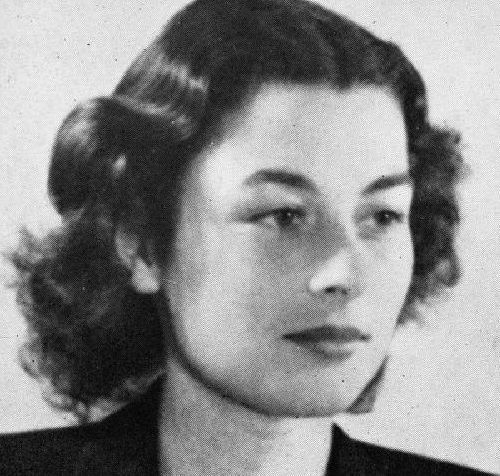
Violette Szabo was a British spy who parachuted into France twice to collect valuable intelligence and paid the highest price for her exceptional bravery.
Born in Paris in 1921, Violette’s mother was French and her father was English. During the Great Depression, her parents couldn’t afford to care for her and she lived with an aunt in Picardy. Finally when she was 11 the family was reunited in London. Violette was a tomboy and natural athlete who loved to compete with her four brothers. Her father taught her how to shoot at a young age, and she was known to be fearless.
Violette grew up in Brixton, and was popular at school due to her bubbly, fun-loving personality and good sense of humor. French was her first language, but she spoke English with a Cockney accent, and also displayed the impish Cockney sense of humor. She left school at age 14 and went to work for a French lingerie company, and then Woolworths.
When WW2 broke out in 1939 Violette was selling perfume in a department store. She immediately joined the Women’s Land Army, a volunteer force of agricultural workers to replace men who were called up to battle, and was sent to pick strawberries in Hampshire, then to work at an armaments factory in London.
In 1940 Violette’s French mother sent her to a Bastille Day parade in London, and told her to bring a homesick French soldier home for dinner. She met Etienne Szabo, a decorated non-commissioned officer in the French Foreign Legion and after a whirlwind 42-day romance, they got married. She was 19, he was 31. They had a week honeymoon before Etienne left to join the Free French fight against the pro-German Vichy regime.
Violette became a switchboard operator in central London during the German blitz. Bored with her job and itching to join the fight, she joined the Auxiliary Territorial Service, the women’s branch of the British Army. She underwent an intensive training program in Leicester and was then assigned to an Anti-Aircraft Regiment. Soon after she discovered she was pregnant, so she returned to London where her daughter Tania was born in June 1942. Three months later, Violette learned that her husband had been killed in action, fighting the Axis powers in North Africa, without ever meeting his baby daughter.
Violette was more determined than ever to fight the enemy that killed her husband. Speaking both English and French without an accent, she was recruited to train as a field agent in the Special Operations Executive, a British intelligence and espionage agency. She was given security clearance and went to a special training school in the Scottish Highlands in the summer of 1943 where she studied navigation, weapons and demolition. She passed the course, and went on to more advanced training at the SOE “finishing school” in Hampshire, where she learned cryptography, weaponry, survival skills, how to evade capture, and how to escape if captured. British journalist Max Hastings wrote that Violette was “adored by the men and women of SOE both for her courage and endless infectious Cockney laughter.”
The last stage in training was parachute jumping, which was taught at an airport near Manchester. Violette badly sprained her ankle on her first jump, but after several weeks to recover she tried again and passed.
On April 5, 1944, Violette was flown from a Royal Air Force station in Bedfordshire in a B-24 Liberator bomber and parachuted into German-occupied France. She had a fake identity as a French secretary, and a mission to act as a courier for the Resistance. Her fellow anti-Nazi fighters called her “La Petite Anglaise” (The Little English Woman) as she was only five feet tall. She gathered intelligence and carried out reconnaissance, and the information she collected helped the Allies identify German bombing targets. She returned to England, and was soon being sent on an even more dangerous mission. Knowing the dangers, she made a will and cried as she said goodbye to her daughter and her mother.
Violette parachuted back into France on June 8, 1944, right after the D-Day landings. Unfortunately, this trip was not as successful. She was in a car with two members of the Resistance when they hit a German roadblock, which led to a shoot-out. Violette was wounded and captured. Despite being injured, she was taken to the German military prison, where she was tortured, but refused to give up any information about her associates. She was seen twice a day limping across the courtyard to face brutal interrogations. As her health worsened, Violette was sent to the notorious Ravensbruck concentration camp for women in Germany. While there, she was beaten, starved, and possibly sexually assaulted. Finally, in early 1945, Violette was taken to “execution alley” and shot in the head. She was 23 years old.
After her death, Violette was honored by her country with the presigious George Cross, a medal for bravery created by George VI in 1940. Violette remains one of only four women in history to receive the George Cross. It was presented to her five year old daughter Tania in 1947. Violette was also awarded the Croix de Guerre by the French government in 1947. She and her husband Etienne were the most decorated married couple of World War II, and their exceptional bravery cost them their lives.
After the war, Violette’s parents emigrated to Australia with Tania. In 1958, Violette’s incredible story was made into a movie, “Carve Her Name With Pride.” Tania described her mother’s life as “short but lived to the full, with much happiness, joy, some deep sadness, and great endeavor.”
For bravely parachuting into Occupied France – twice – and helping defeat the Germans, we honor Violette Szabo as this week’s Thursday Hero.
Get the best of Accidental Talmudist in your inbox: sign up for our weekly newsletter.